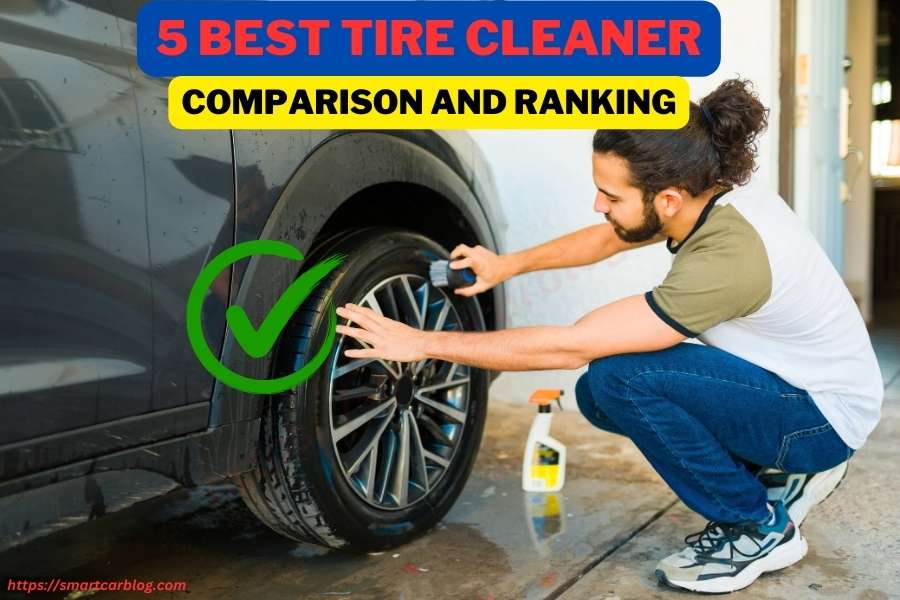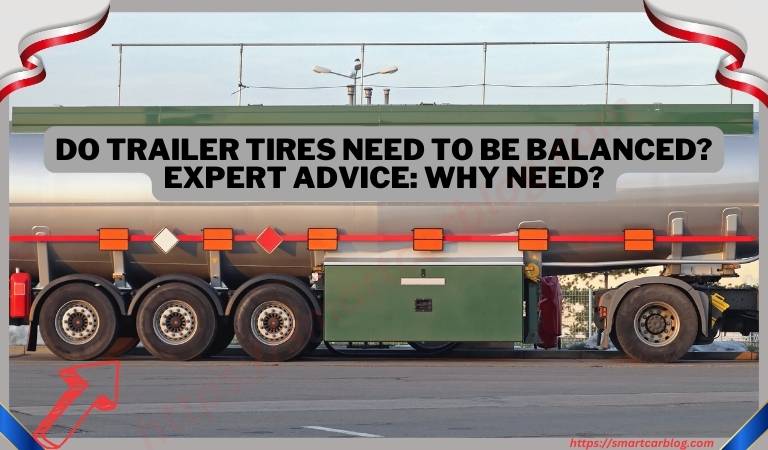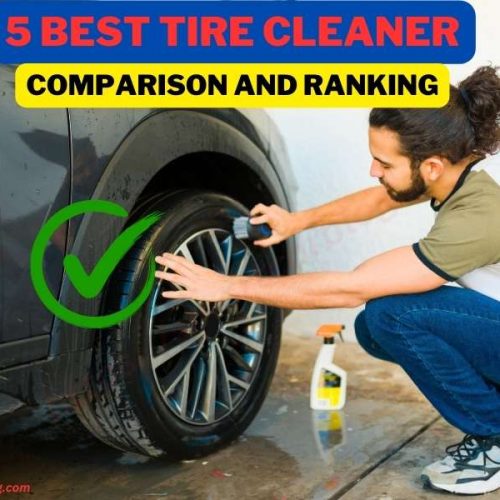When it comes to maintaining a trailer, one question that often arises is: Do trailer tires need to be balanced? The answer is crucial for anyone who owns or operates a trailer, as it touches on aspects of safety, performance, and longevity. Balancing trailer tires might seem like a small part of overall maintenance, but its impact is significant. Just as with passenger vehicles, the balance of trailer tires affects how evenly the tire wears, how smoothly the trailer rides, and, ultimately, how safely it operates.
This Article sets the stage for a deeper exploration of the importance of tire balancing for trailers. Whether you use your trailer for weekend getaways, hauling equipment, or as part of your business, understanding the role of tire balancing can make a considerable difference. It’s about more than just preventing vibrations; it’s about ensuring that your trailer performs optimally and safely over every mile. By delving into this topic, we aim to provide clear insights and practical advice, addressing this common query with the depth and attention it deserves.
Table of Contents
ToggleUnderstanding the Importance of Tire Balancing
Tire balancing is a crucial aspect of trailer maintenance that often goes overlooked. But why is it so important? Simply put, balanced tires ensure a smoother ride, reduce tire wear, and improve fuel efficiency. When trailer tires are not properly balanced, it can lead to uneven tire wear, putting you at risk of a blowout while on the road.
More than just a safety concern, unbalanced tires can also cause unnecessary strain on your trailer’s suspension system, leading to costly repairs. Regular tire balancing checks are a small step that can extend the life of your tires significantly, ensuring both your safety and your trailer’s longevity. So, the next time you question, “Do trailer tires need to be balanced?” remember that this simple maintenance task is key to a safer and more efficient journey.
Addressing Common Questions About Trailer Tires
Trailer owners often have a variety of questions regarding their tires, and rightly so. Tires are the foundation of your trailer’s performance and safety. One of the most frequent inquiries is about tire pressure – how much is needed? The answer varies based on the trailer’s weight and the tire type, but maintaining the correct pressure is vital for maximizing tire life and ensuring safety. Another common question is about the frequency of tire replacement.
Generally, trailer tires should be inspected regularly and replaced every 3-5 years, regardless of their appearance, as rubber degrades over time. Understanding these aspects of trailer tire maintenance not only helps in making informed decisions but also plays a pivotal role in ensuring a smooth and safe towing experience.
Exploring the Necessity of Balancing Trailer Tires
The question of whether trailer tires need balancing is not just a matter of routine maintenance; it’s a fundamental aspect of ensuring your trailer’s optimal performance and safety. Balancing trailer tires is often overshadowed by other maintenance tasks, but its importance cannot be overstated.
Tires that are balanced properly reduce tire wear, increase fuel efficiency, and provide a smoother ride. By distributing the weight of the tires equally across the axle, this procedure avoids vibrations, which can hasten tire wear and tear. Ignoring this critical step might make your trailer ride harsher and, more crucially, make it less safe to drive overall.
Should I Have My Trailer Tires Balanced?
The straightforward answer is yes. Balancing your trailer tires is an essential part of trailer upkeep. When tires are balanced, it leads to a reduction in vibrations felt during towing. This not only enhances the comfort of your journey but also contributes to the longevity of the tires and trailer components.
Regular tire balancing checks are a proactive approach to maintenance, helping to identify and correct any imbalances before they evolve into more significant issues. It’s a small investment in both time and money that pays off in the long run by preserving your trailer’s condition and ensuring a safer travel experience.
Factors Influencing the Need for Balancing
Several factors determine the frequency and necessity of balancing your trailer tires. The type of trailer, its load capacity, the distance travelled, and the roads you traverse all play a role. Heavier loads and longer journeys, especially on uneven terrain, can cause more rapid imbalance in tires. The age and quality of the tires also influence their balance.
Over time, tires can lose their shape and balance, necessitating more frequent checks. Additionally, any time you replace or repair a tire, it should be balanced to ensure that it matches the others. Being aware of these factors and responding accordingly can significantly enhance your trailer’s performance and safety.
Identifying the Need for Tire Balancing
Recognizing when to balance your trailer tires is crucial for maintaining optimal performance and safety. Tire balancing is not just a routine task; it’s an integral part of ensuring your trailer’s reliability and longevity. The process involves adjusting the weight distribution around the tire to prevent uneven wear and tear.
This is especially important for trailers, as they are often subject to varying loads and road conditions. Effective tire balancing can result in a smoother ride, extended tire life, and improved fuel efficiency. Knowing when to balance your tires can save you from future costly repairs and enhance your overall towing experience.
How Do I Know if My Tires Need to Be Balanced?
Determining when your trailer tires need balancing is key to effective trailer maintenance. The most common indicator is a vibration or shaking sensation, especially at certain speeds. This vibration can often be felt through the steering wheel or the trailer floor. Uneven tire wear is an additional warning sign. Your tires are obviously out of balance if you notice that they are wearing down unevenly.
Regular inspections by a professional can also help in identifying the need for tire balancing. It’s recommended to check the balance of your trailer tires at least once a year or after every 12,000 miles, whichever comes first.
Signs and Symptoms of Imbalance in Trailer Tires
An imbalance in trailer tires can manifest in several ways. Apart from the noticeable vibrations and uneven tire wear, you might also experience a decrease in fuel efficiency. An imbalanced tire can cause your trailer to work harder, which in turn consumes more fuel. In extreme circumstances, especially when travelling at a faster pace, you might even detect the trailer shaking. The bearings and suspension system of the trailer may experience early wear as a result of this shaking.
Additionally, an imbalanced tire can contribute to a decrease in overall driving comfort, making long journeys less enjoyable. Being aware of these signs and addressing them promptly is key to maintaining the safety and efficiency of your trailer.
The Consequences of Ignoring Tire Balancing
Unexpectedly, there can be more serious repercussions if you neglect the tire balancing on your trailer. Although tire balancing is sometimes overlooked as a little part of trailer maintenance, it is essential to maintaining both the safety and best performance of your trailer. Improper tire balancing can result in several problems that not only compromise your driving experience but also provide significant safety hazards. Ignoring this important maintenance step can have expensive and severe consequences that compromise everything from tire longevity to your trailer’s structural integrity.
What Happens If You Don’t Balance Trailer Tires?
The immediate effect of unbalanced trailer tires is often a noticeable degradation in ride quality. You may experience excessive vibration, especially at higher speeds, which can be felt through the steering wheel or the trailer itself. This vibration is more than just a discomfort; it’s a sign of uneven wear on your tires, which can drastically shorten their lifespan.
Furthermore, unbalanced tires can lead to poor fuel efficiency, as the trailer requires more power to tow. The uneven distribution of weight on the tires also puts additional stress on the trailer’s suspension and bearings, potentially leading to premature wear and the need for costly repairs.
Long-Term Effects on Trailer Performance and Safety
In the long term, the consequences of not balancing trailer tires can be severe. Consistently driving with unbalanced tires can lead to uneven and accelerated tire wear, forcing you to replace them sooner than expected. This uneven wear can also compromise the grip and handling of the trailer, particularly in adverse weather conditions, thereby increasing the risk of accidents.
Additionally, the added strain on the trailer’s suspension and wheel bearings from unbalanced tires can result in more significant mechanical issues over time. These problems not only incur higher maintenance costs but also pose a significant safety risk, as they can compromise the structural integrity and reliability of your trailer.
Specifics for Different Trailer Types
There are differences between trailers when it comes to tire balancing. To achieve maximum performance and safety, different types of trailers have different requirements and obstacles that must be handled. It is essential to comprehend the details of tire balance for various trailer types. The method for balancing tires can differ greatly depending on whether you drive a specialty boat trailer or a single-axle trailer.
This section explores the subtleties of tire balance for these particular trailer types, emphasizing how important it is to customize maintenance procedures to the particular requirements of each trailer.
Balancing Tires on Single Axle Trailers
Single-axle trailers present a distinct set of challenges when it comes to tire balancing. Due to their design, the entire load is concentrated on one axle, making balanced tires a critical factor for stable and safe towing. An imbalance in a single-axle trailer’s tires can lead to excessive vibration, which not only affects ride comfort but also puts additional stress on the trailer’s structure.
This vibration can exacerbate wear on both the tires and the trailer’s components, leading to a shorter lifespan for both. Regular tire balancing is essential for single-axle trailers, as it ensures even weight distribution across the tires, minimises vibration and helps maintain the trailer’s structural integrity.
Considerations for Boat Trailer Tires
Boat trailers pose their own unique set of considerations when it comes to tire balancing. These trailers are often subjected to different environments, including frequent exposure to water and varying load conditions. The tires of a boat trailer must be balanced to accommodate these varying conditions while ensuring a smooth tow to and from the water.
Additionally, the frequent exposure to water and moisture means that boat trailer tires can be more susceptible to corrosion and wear, making regular tire balancing and inspections even more crucial. Balancing boat trailer tires not only contributes to a smoother ride but also helps prevent premature tire wear and potential safety hazards associated with towing a heavy load.
The Case of Semi-Trailer Tires
Semi-trailers, integral to the transportation and logistics industry, require meticulous maintenance to ensure their efficiency and safety. Tire balancing in semi-trailers is a subject that warrants special attention due to the heavy-duty nature of these vehicles. Unlike smaller trailers, semi-trailers face unique challenges due to their size, load capacity, and the distances they cover.
Proper tire maintenance, including balancing, is not just a recommendation but a necessity. This section explores the importance of Tire balancing specifically for semi-trailers, underscoring how this practice contributes to the overall performance and safety of these large vehicles.
Do Semi Trailer Tires Need to Be Balanced?
The topic of whether or not semi-trailer tires need to be balanced has major consequences for large-scale transportation. The answer is definitely yes. For several reasons, semi-trailer tire balancing is essential.
Because of the weighty weights they support, an imbalance in the tires can cause uneven wear, shortening their lifespan and necessitating replacements more frequently.
Tire imbalances can result in vibrations that are uncomfortable for the driver and increase the strain on the trailer’s mechanical parts. Higher maintenance expenses and possible downtime may follow from this. Tires that are properly balanced are essential for maintaining road safety and lowering the possibility of accidents brought on by flat tires.
Industry Practices for Heavy-Duty Trailers
In the world of heavy-duty trailers, industry practices regarding tire balancing are both rigorous and essential. Many fleet operators and transportation companies prioritise regular tire maintenance, including balancing, as part of their standard operating procedures. This is not only to comply with safety regulations but also to optimise performance and fuel efficiency.
The industry typically employs advanced balancing techniques and equipment, recognizing that the larger scale and higher stakes of semi-trailer operations demand precision. Regular check-ups, alongside the use of balancing beads or other balancing solutions, ensure that the tires are in optimal condition, providing a smoother ride, reducing tire wear, and enhancing overall road safety.
Must Read: How Long Does It Take To Patch A Tire?: You Need To Know!
Must Read: How Long Does a Tire Plug Last?
Step-by-Step Guide to Balancing Trailer Tires
Balancing trailer tires is a critical aspect of maintaining your trailer’s performance and safety. While many opt for professional services, understanding how to balance trailer tires yourself can be both cost-effective and rewarding.
This step-by-step guide is designed to walk you through the process of balancing trailer tires, offering insights into the tools and techniques required. Whether you’re a seasoned trailer owner or new to the world of towing, this guide aims to empower you with the knowledge to perform Tire balancing efficiently and effectively.
How to Balance Trailer Tires: A DIY Approach?
Gather Necessary Equipment: Before you start, ensure you have a tire balancer, weights, a wrench, and safety equipment like gloves and goggles.
Remove the Tire: Safely lift the trailer using a jack and remove the Tire from the axle.
Mount the Tire on a Balancer: Place the Tire on a balancing machine or a manual balancer. Ensure it’s properly centered and secured.
Spin and Identify Imbalances: Spin the Tire and watch for any heavy spots that cause the Tire to stop in a specific position repeatedly. These are areas where balancing is needed.
Apply Weights: Attach balancing weights to the opposite side of the heavy spots. These weights counterbalance the Tire’s weight distribution.
Recheck Balance: Spin the Tire again to ensure it stops randomly, indicating a proper balance.
Reattach the Tire: Once balanced, reattach the Tire to your trailer. Repeat the process for each Tire.
Test Drive: After balancing all tires, take a short test drive to ensure there are no vibrations and that the balance feels right.
Tools and Techniques for Effective Balancing
Balancing trailer tires requires precision and the right tools. The most common tools for this task include:
- Tire Balancer: A machine or manual balancer is essential for determining the imbalance in the Tire.
- Weights: These are used to counterbalance any heavy spots on the Tire. They come in various types, like clip-on or adhesive weights.
- Basic Hand Tools: A wrench for removing and attaching the Tire and a jack for lifting the trailer are necessary.
Note: The technique of balancing involves understanding the distribution of weight around the Tire. It’s about adding weights in the right spots to ensure even distribution. At all times in this process, patience and close attention to detail are essential. Always remember that safety comes first, and wear protective gear when working in dangerous conditions.
The Impact of Unbalanced Tires on Trailers
Understanding the impact of unbalanced tires on trailers is crucial for any trailer owner or operator. Unbalanced tires can lead to a range of problems, affecting everything from the safety and performance of the trailer to its overall longevity. This section delves into the various ways in which unbalanced tires can adversely affect trailers, highlighting the importance of regular tire balancing.
By exploring both the safety concerns and performance issues, as well as discussing strategies to reduce wear and tear, this guide aims to provide comprehensive insights into the significant role tire balancing plays in the upkeep of trailers.
Safety Concerns and Performance Issues
On a trailer, unbalanced tires can cause major performance problems as well as safety hazards. Tire blowouts are one of the most obvious consequences and can be hazardous, particularly while towing at high speeds. Reduced traction and grip on the road are the result of uneven tire wear, which is another effect of unbalanced tires. This could have a big effect on how the trailer handles and make it harder to control, especially in bad weather.
Furthermore, jeopardizing safety is the vibration that comes from imbalanced tires, which can exacerbate driver pain and weariness. These performance problems put other drivers on the road as well as the driver and the weight being towed at risk.
Reducing Wear and Tear Through Proper Balancing
Reducing wear and tear on the tires and the trailer requires routine tire balancing. Tires that are properly balanced minimise stress on any one component by distributing weight equally across the tire. Maintaining optimal tire performance and extending tire life are made possible by this uniform distribution. Balanced tires not only prolong the life of the tires but also shield the trailer’s suspension and bearings from undue damage.
Over time, these preventive measures can save a lot of money since they lessen the need for frequent tire replacements and repairs. In addition, balanced tires provide a more comfortable ride, which improves fuel efficiency and driving enjoyment.
Regular Maintenance of Trailer Tires
To ensure the performance, longevity, and safety of your trailer, regular tire maintenance is essential. This maintenance aims to avoid problems before they start instead of just fixing them when they do. Regular check-ups and tire balancing are important components of this preventive strategy.
You can greatly increase the longevity of your trailer tires and enhance your towing experience by following a maintenance plan and using recommended tire care techniques. This section discusses the significance of planning tire balancing and inspections and provides helpful advice for extending tire life.
Scheduling Tire Balancing and Check-Ups
Establishing a routine for tire balancing and check-ups is essential for maintaining your trailer in top condition. It’s recommended to balance your trailer tires at least once a year or after every 12,000 miles, whichever comes first. However, this can vary based on your trailer usage, the types of roads traveled, and the weight of loads carried.
Regular check-ups by a professional can help identify issues like uneven tire wear, air pressure inconsistencies, and potential damage that might not be immediately visible. These check-ups not only ensure your tires are properly balanced but also provide an opportunity to inspect the overall condition of your trailer’s wheels and suspension system.
Tips for Prolonging Tire Life
Regular Inspection: Regularly inspect your tires for signs of wear, damage, or foreign objects lodged in the tread.
Maintain Proper Air Pressure: Always keep your tires inflated to the manufacturer’s recommended pressure level. Underinflated or overinflated tires can lead to uneven wear and reduced performance.
Rotate Tires Regularly: Tire rotation helps in even wear distribution. Consider rotating your trailer tires every 5,000 to 8,000 miles.
Avoid Overloading: Adhere to the recommended load capacity of your trailer. Overloading can put excessive strain on your tires, leading to quicker wear.
Store Properly: To avoid the tires deteriorating from UV exposure, store your trailer away from direct sunshine and in a cool, dry location when not in use.
Use Tire Covers: To shield your trailer’s tires from the weather when storing it outside for a long time, use tire covers.
Drive Carefully: Avoid harsh driving habits like sudden stops and starts, which can put extra stress on your tires.
Final thought
In summary, Do Trailer Tires Need To Be Balanced? The answer to the question of whether trailer tires require balancing is in the affirmative. It is not merely advised to balance your trailer tires; doing so is crucial to preserving the longevity, functionality, and safety of your vehicle. This procedure makes sure that the weight is dispersed properly throughout the tire’s surface, which is important for lowering vibrations, minimising wear and tear, and improving overall comfort while driving.
Tires for trailers that are routinely balanced have many advantages. They increase fuel economy, prolong tire life, and—above all—protect your safety while driving. Unbalanced tires, particularly while under heavy load or travelling at high speeds, can result in uneven wear and blowouts, which can cause accidents. Additionally, they increase the load on the suspension system of the trailer, requiring more frequent and expensive repairs.
It’s important to remember that tire balancing should be done by a professional or, if you choose a DIY approach, with the correct tools and a thorough understanding of the process. Regular check-ups, as part of your trailer’s maintenance routine, will help identify when your tires need balancing. This proactive approach to tire maintenance is a small investment of time and resources that pays off significantly in the long run.
FAQ: Do Trailer Tires Need To Be Balanced?
Q: How often should I balance my trailer tires?
A: Ideally, balance your trailer tires once a year or every 12,000 miles. However, this may vary based on usage and load.
Q: What are the signs of unbalanced trailer tires?
A: Watch for vibrations in the trailer, uneven tire wear, and reduced fuel efficiency – these are common indicators of tire imbalance.
Q: Can I balance the trailer tires myself?
A: Yes, you can balance trailer tires yourself using a tire balancer and weights, though seeking professional help ensures precision.
Q: What happens if I don’t balance my trailer tires?
A: Neglecting tire balancing can lead to uneven tire wear, increased fuel consumption, and potential safety hazards.
Q: Does tire balancing affect trailer performance?
A: Definitely, balanced tires improve handling, reduce tire wear, and enhance overall trailer performance.
Q: Are there specific balancing needs for different trailer types?
A: Yes, different trailers, like single axle or boat trailers, have unique balancing requirements based on their design and use.
Q: What tools do I need for balancing trailer tires?
A: You’ll need a tire balancer, appropriate weights, and basic hand tools to balance trailer tires effectively.
Q: Do new trailer tires require balancing?
A: Yes, new trailer tires should be balanced to ensure optimal performance and safety from the start.
Q: Can tire balancing save me money in the long run?
A: Absolutely. Regular tire balancing reduces wear and tear, decreasing the frequency of tire replacements and repairs, thus saving you money.




 Welcome to SmartCarBlog.com! I’m Rashel Miajee, The proud founder of smartcarblog.com. This is a part of
Welcome to SmartCarBlog.com! I’m Rashel Miajee, The proud founder of smartcarblog.com. This is a part of 


